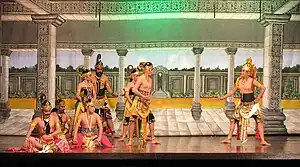| Komedi Stambul | |
|---|---|
| Originating culture | Indonesia |
| Komedi Stambul |
|---|
|
| Burma |
| Cambodia |
| Indonesia |
|
| Laos |
| Malaysia |
| Philippines |
| Thailand |
|
| Vietnam |
Komedi Stambul (or simply Stambul), spelled Komedie Stamboel during the Dutch colonial era, is a form of trans-ethnic Indonesian folk theatre developed lately 19th-century to the mid 20th-century.[1] The theatre originated in Dutch East Indies (modern-day Indonesia).
Stambul drew inspiration from a variety of styles including Malay, Western, and Chinese opera as well as Middle Eastern music and operetta.
See also
References
- ↑ Rubin, Don (1998). The World Encyclopedia of Contemporary Theatre: Asia. London: Routledge. pp. 357.
This article is issued from Wikipedia. The text is licensed under Creative Commons - Attribution - Sharealike. Additional terms may apply for the media files.
.svg.png.webp)
